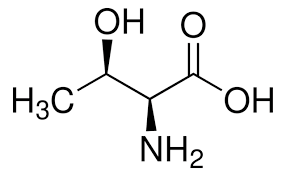L-Threonine

Product Description
L-Threonine is an amino acid with various industrial and nutritional applications.
Product:
L-Threonine
CAS:
72-19-5
Synonym:
(2S,3R)-2-Amino-3-hydroxybutyric acid
Structure:

Typical Characteristics
Appearance
White to off-white powder
Density
1.3126 g/cm3
Melting point
256 °C (decomposes)
Molecular Weight
119.12
Odor
Slight sweet odor
Purity
≥98%
Refractive index
1.507
Uses, Applications & Markets
Key applications
get a quote



L-Threonine used in many
industry applications
L-Threonine is an amino acid with various industrial and nutritional applications. Here are some of its uses:
- Animal Feed Additive: L-Threonine is commonly used as a dietary supplement in animal feed formulations, especially for poultry, swine, and aquaculture. It serves as an essential amino acid required for protein synthesis and growth, helping improve feed efficiency, muscle development, and overall animal health.
- Pharmaceuticals: L-Threonine may be used in the pharmaceutical industry for the production of medications, supplements, and nutritional products. It can be incorporated into formulations for oral or parenteral administration to support protein synthesis, tissue repair, and metabolic functions in humans.
- Food and Beverage Industry: L-Threonine may be added to food and beverage products as a nutritional supplement or functional ingredient. It can enhance the amino acid profile of food products, improve protein quality, and support protein synthesis in the body.
- Cosmetics and Personal Care: L-Threonine may find applications in cosmetics, skincare products, and personal care items. It can be used in formulations for hair care, skin care, and bath products to support skin barrier function, hydration, and collagen synthesis.
- Biotechnology: L-Threonine is used in biotechnology applications for cell culture and fermentation processes. It serves as a nutrient source for microbial growth and protein production in bioreactors, fermenters, and other bioprocessing systems used in the production of enzymes, antibodies, and recombinant proteins.
- Research and Development: L-Threonine is utilized in research laboratories for studying protein structure, function, and metabolism. It may be used as a substrate or standard reference material in biochemical assays, protein labeling, and metabolic studies related to human health and disease.
- Dietary Supplements: L-Threonine is available as a standalone dietary supplement or as part of multivitamin and amino acid formulations. It may be consumed orally in the form of capsules, tablets, powders, or liquid solutions to support overall health, muscle growth, and physical performance.
- Functional Foods: L-Threonine may be incorporated into functional food products designed to provide specific health benefits beyond basic nutrition. It can be added to protein bars, beverages, and meal replacements targeting athletes, fitness enthusiasts, and individuals with specific dietary needs.
- Enzyme Production: L-Threonine is used in the production of enzymes and enzyme preparations for various industrial applications. It may serve as a nutrient source or inducer for microbial cultures used in enzyme production processes for food processing, textile industry, and biocatalysis.
- Agricultural Applications: L-Threonine may have applications in agriculture for enhancing plant growth, stress tolerance, and crop yield. It can be used as a foliar spray, soil amendment, or fertilizer additive to improve nutrient uptake, root development, and plant defense mechanisms.